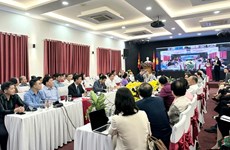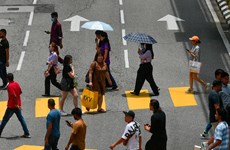AIPA’s committees debate wide-ranging issues
The ongoing 34th General Assembly of the ASEAN Inter-Parliamentary
Assembly (AIPA) in Bandar Seri Begawan, Brunei, on September 20
witnessed a series of meetings of its committees which made important
decisions to the bloc.
The ongoing 34th General Assembly of the ASEAN Inter-Parliamentary
Assembly (AIPA) in Bandar Seri Begawan, Brunei, on September 20
witnessed a series of meetings of its committees which made important
decisions to the bloc.
At the meeting of the Committee on Political Matters, delegates pointed to the importance of a close-knit ASEAN to contribute to the regional peace, stability, development and prosperity.
They pledged to intensify AIPA’s active role in supporting the construction of an ASEAN Political – Security Community Council (APSC) by harmonising member countries’ legal frameworks and building common conduct standards.
This function underlined the role of ASEAN in consolidating peace, stability, security and maritime safety in the East Sea; solving disputes by peaceful means in conformity with international laws, particularly the United Nation Convention on the Law of the Sea in 1982 (UNCLOS 1982); fully and effectively realising the Declaration on the Conduct of Parties in the East Sea (DOC); and heading towards a Code of Conduct for Parties in the East Sea (COC).
Meanwhile, the meeting of the Committee on Economic Matters debated a draft resolution on enhancing the sustainable development of small- and medium-sized enterprises. Delegates also agreed that fueling green growth is an effective measure to cope with problems arising in the formation of the ASEAN Economic Community.
At a similar event of the Committee on Social Matters, they approved draft resolutions on the acceleration of the youth’s role in dealing with ASEAN’s future challenges, the role of AIPA in carrying out the post-2015 development programmes, and cooperation in building a free-of-child-abuse ASEAN region.
At the meeting of the Committee on Organisational Matters, delegates from member countries adopted 19 resolutions regarding the organisation of AIPA, the approval of Timor Leste as an AIPA observer, and the implementation of AIPA resolutions, among others.
On the day, AIPA held dialogue sessions with Belarus, Canada, China, India, Japan, Russia and the European Parliament, which are its observers.-VNA
At the meeting of the Committee on Political Matters, delegates pointed to the importance of a close-knit ASEAN to contribute to the regional peace, stability, development and prosperity.
They pledged to intensify AIPA’s active role in supporting the construction of an ASEAN Political – Security Community Council (APSC) by harmonising member countries’ legal frameworks and building common conduct standards.
This function underlined the role of ASEAN in consolidating peace, stability, security and maritime safety in the East Sea; solving disputes by peaceful means in conformity with international laws, particularly the United Nation Convention on the Law of the Sea in 1982 (UNCLOS 1982); fully and effectively realising the Declaration on the Conduct of Parties in the East Sea (DOC); and heading towards a Code of Conduct for Parties in the East Sea (COC).
Meanwhile, the meeting of the Committee on Economic Matters debated a draft resolution on enhancing the sustainable development of small- and medium-sized enterprises. Delegates also agreed that fueling green growth is an effective measure to cope with problems arising in the formation of the ASEAN Economic Community.
At a similar event of the Committee on Social Matters, they approved draft resolutions on the acceleration of the youth’s role in dealing with ASEAN’s future challenges, the role of AIPA in carrying out the post-2015 development programmes, and cooperation in building a free-of-child-abuse ASEAN region.
At the meeting of the Committee on Organisational Matters, delegates from member countries adopted 19 resolutions regarding the organisation of AIPA, the approval of Timor Leste as an AIPA observer, and the implementation of AIPA resolutions, among others.
On the day, AIPA held dialogue sessions with Belarus, Canada, China, India, Japan, Russia and the European Parliament, which are its observers.-VNA













